A neurocognitive test assesses cognitive functions like memory and problem-solving, offering insights into brain health.

Neurocognitive Test
Evaluate your cognitive health comprehensively with our Neurocognitive Test, providing insights into memory, attention, problem-solving, and more.
Use Template
Neurocognitive Test Template
Commonly asked questions
Test duration varies, typically 30 minutes to a few hours, based on complexity.
It's administered for memory issues, cognitive decline suspicion, research, or baseline assessment in specific populations.
EHR and practice management software
Get started for free
*No credit card required
Free
$0/usd
Unlimited clients
Telehealth
1GB of storage
Client portal text
Automated billing and online payments











